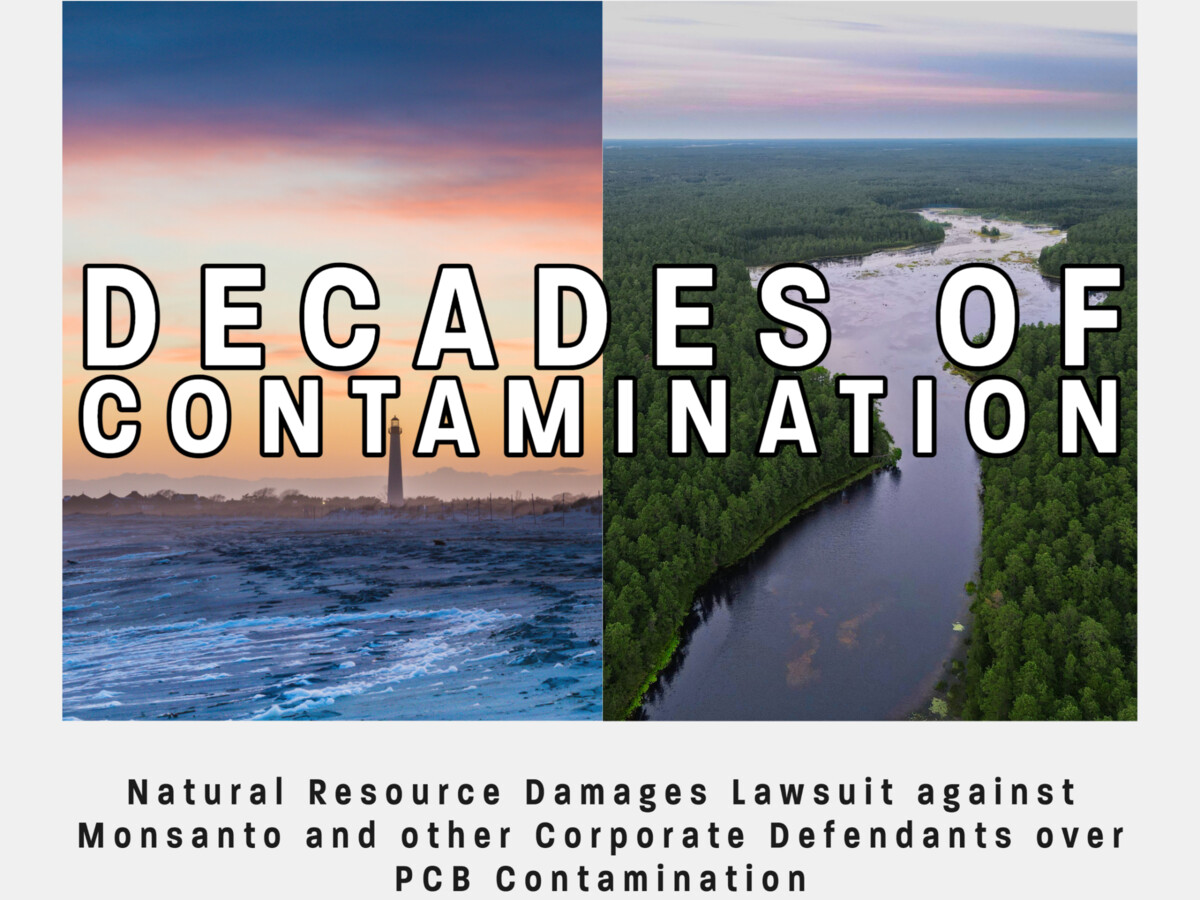Image


The New Jersey Department of Environmental Protection has filed a lawsuit against Monsanto Co. (bought by Bayer in 2018) and two other corporate defendants over extensive damage to New Jersey’s natural resources caused by contamination from toxic chemical compounds known as PCBs (polychlorinated biphenyls).
In addition to St. Louis-based Monsanto Co., the lawsuit names as defendants Solutia, Inc. and Pharmacia LLC. (Owned by parent company Pfizer).
Through a series of corporate reorganization transactions beginning in the late 1990s, each of the three defendant companies took on a component of an overall business once operated under the Monsanto name – referred to in the State’s complaint as “Old Monsanto.”
Filed on August 4, 2022, in New Jersey Superior Court, the lawsuit seeks compensation from the defendants for Natural Resource Damages (NRD) caused by their corporate predecessor’s longtime manufacturing, distribution, and sale of toxic PCBs, as well as the company’s reckless long-term discharge of PCBs from its facility along the Delaware River in Bridgeport, Gloucester County.
PCBs are synthetic organic chemical compounds. Prior to being banned in the 1970s, they were used for decades in the manufacture of many products including paints, caulks, inks, dyes, paper products, lubricants, coolants, fireproofing, and such industrial equipment as capacitors and transformers.
Among other threats to human health, the complaint notes, studies have shown a correlation between PCBs and liver damage, thyroid problems, skin irritation, susceptibility to respiratory infection and other immune system issues, memory and learning deficits – particularly in infants and children – reproductive problems, and certain cancers.
PCBs have similar effects on all kinds of wildlife, and in particular, are associated with eggshell thinning and lower reproductive success rates in birds and turtles.
The State’s complaint notes that Old Monsanto manufactured, marketed, and sold PCBs from approximately 1929 to 1977 – often under the trade name Aroclor – and that the company was responsible for “99 percent or more” of all PCBs used or sold within the U.S.
The complaint lists more than 40 industrial and other companies throughout New Jersey known to have purchased and utilized PCBs from Old Monsanto.
The complaint also alleges that Old Monsanto knew decades ago that exposure to PCBs was potentially harmful to human and animal health.
“PCBs contamination has harmed natural resources and threatened the health of humans and wildlife in every corner of New Jersey, from remote rural areas to suburban neighborhoods, to our cities. That includes many environmental justice communities – communities throughout our State that for too long have borne a disproportionate exposure to environmental damages and dangers,” said Acting Attorney General Platkin.
In the 1950s, the complaint alleges, Old Monsanto’s medical office specifically advised workers not to eat lunch in the PCB department, and the company medical director “openly declared that ‘we know Aroclors are toxic.’”
Internal company communications from the late 1960s, the complaint notes, also show Old Monsanto officials acknowledging the potential for “massive contamination” of natural resources with PCBs in New Jersey and beyond.
The complaint points to an internal Old Monsanto document that references the potential for “nearly global” contamination and environmental harms, but that “there is too much customer/market need and selfishly too much Monsanto profit” to warrant discontinuing PCB production.
The complaint further alleges that, statewide, PCBs manufactured by Old Monsanto have caused significant, long-term damage to New Jersey’s surface waters, groundwater, soil, and air, as well as fish, birds, and other wildlife.
The complaint asserts that hundreds of bodies of water in New Jersey spanning more than 6,000 river miles and more than 14,000 lake acres – as well as 400 square miles of bays and estuaries – are known to have been damaged by PCB contamination.
For many years, the lawsuit notes, Old Monsanto added to the harm caused by its own operations and disposal practices by recommending that its customers dispose of liquid PCB waste directly into sewers. Old Monsanto also urged its customers to vent PCB vapors into the atmosphere, despite its awareness that such action would introduce dangerous toxins into the air.
“Yet some businesses that created harmful chemicals that now litter our environment have never been held fully accountable for the damage they left behind. Due to Monsanto’s manufacturing of persistent PCB chemicals decades ago, natural resources throughout New Jersey—our soil, groundwater, wetlands, waterways, fish, and wildlife—are still recovering from extensive harm,” said Commissioner LaTourette.
According to the complaint, Old Monsanto’s operations and disposal practices in Bridgeport resulted not only in contamination of the neighboring Delaware River and nearby Birch Creek with PCBs, but also with other toxic chemicals known to impact human health, including benzene, chlorobenzene, toluene, trichloroethylene, and vinyl chloride.
Last week’s lawsuit alleges violations of New Jersey’s Spill Compensation and Control Act, Water Pollution Control Act, and Solid Waste Management Act. It also includes common law claims alleging negligence, trespass, creating a public nuisance, and multiple counts of strict product liability.
-
UPDATE: Bayer has reached out to Morristown Minute asking to add a response to this article. The statement below was released today by Bayer in response to the above lawsuit...
“We are reviewing this lawsuit and will respond to the complaint in greater detail at the appropriate time; however, we believe it is without merit and the company should not be responsible for the alleged remediation costs. Monsanto voluntarily ceased its lawful manufacturing of PCBs 45 years ago—that were once required by many electrical and building codes—and these materials were used in a variety of finished products that were manufactured by third party companies who were customers of Monsanto at the time. Where it has been determined that PCB-related response activities are recommended, federal and state authorities employ an effective system to identify dischargers and allocate response cost responsibilities.”
Follow Morristown Minute on Facebook, Instagram, and Twitter for more state and local updates.